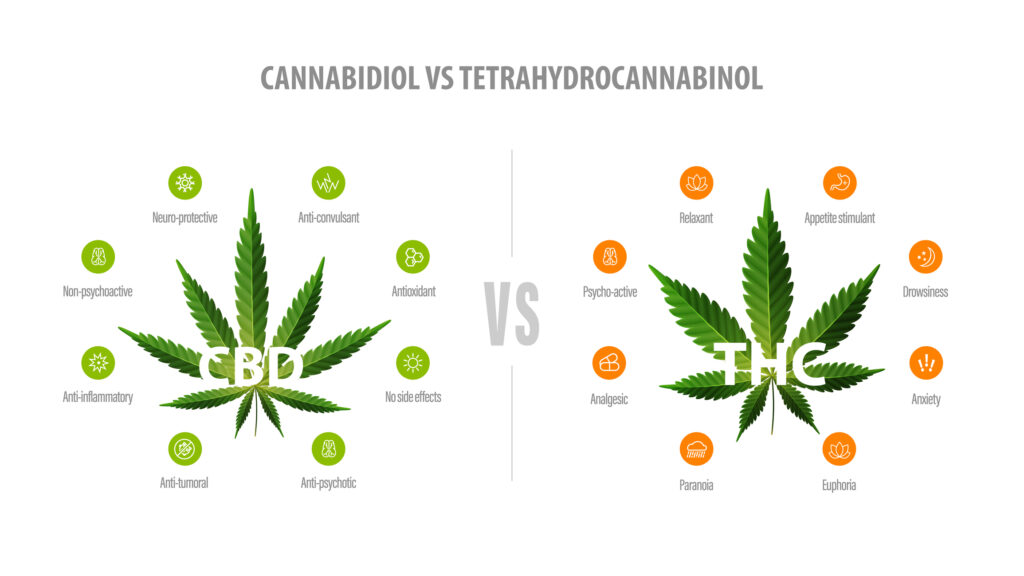CBD vs. THC: Understanding the Key Differences and Their Health Benefits
When it comes to medical cannabis, you may have heard a lot about CBD and THC. But what exactly are they, and how can they benefit you? While both come from the cannabis plant, they have unique effects on the body. Understanding their differences can help you make informed choices about which one is right for your personal wellness journey.
What is CBD and How Can It Help You?
CBD, or cannabidiol, is a non-psychoactive compound found in cannabis and hemp plants. Unlike THC, CBD won’t make you feel “high.” Instead, it works with your body’s natural systems to promote balance and overall wellness. Here’s how CBD might help you:
- Relieve Pain Naturally: If you suffer from chronic pain, arthritis, or migraines, CBD’s anti-inflammatory properties might provide relief.
- Reduce Anxiety and Stress: Struggle with anxiety? CBD can help calm your mind by interacting with serotonin receptors.
- Improve Sleep: If insomnia keeps you up at night, CBD could help you relax and get better rest.
- Support Brain Health: Research suggests CBD may be beneficial for conditions like epilepsy, Alzheimer’s, and multiple sclerosis.
- Safe for Daily Use: Unlike some medications, CBD is non-addictive and can be incorporated into your daily wellness routine.
What is THC and When Might You Need It?
THC, or tetrahydrocannabinol, is the compound in cannabis that creates a “high.” While it affects perception and mood, THC also has powerful medical benefits that may be helpful for you, including:
- Managing Severe Pain: If you have chronic or severe pain, THC may provide stronger relief than CBD alone.
- Stimulating Appetite: If you struggle with appetite loss due to medical treatments or eating disorders, THC can help.
- Easing Nausea: THC is often prescribed to chemotherapy patients to combat nausea and vomiting.
- Relaxing Muscles: If you have multiple sclerosis or Parkinson’s disease, THC may help reduce muscle spasms and stiffness.
- Boosting Mood: Some people find THC useful for managing depression or PTSD, though it’s important to find the right dosage.
CBD vs. THC: Which One is Right for You?
| Feature | CBD | THC |
|---|---|---|
| Will It Get You High? | No | Yes |
| Legal Status (U.S.) | Federally legal (if derived from hemp) | Legal in some states but federally restricted |
| Best For | Anxiety, pain, inflammation, sleep issues, seizures | Pain relief, appetite stimulation, nausea, muscle relaxation |
| Side Effects | Mild (dry mouth, fatigue, changes in appetite) | Possible paranoia, dry mouth, memory issues |
| Risk of Addiction | Non-addictive | May have some dependency risk with prolonged use |
How to Choose What’s Best for You
Your choice between CBD and THC depends on your personal needs and health goals. If you want relief from anxiety, inflammation, or seizures without feeling intoxicated, CBD may be the better option. If you’re dealing with severe pain, nausea, or appetite loss, THC might be more beneficial.
Many people find that a combination of both works best. For example, a 1:1 ratio of CBD to THC is often used for pain relief without overwhelming psychoactive effects.
Final Thoughts: Making the Best Choice for Your Wellness
Both CBD and THC offer unique benefits, and understanding their differences can help you make the best choice for your health. As research continues, more people are discovering how these compounds can improve their well-being. If you’re considering using CBD, THC, or both, talk to a healthcare professional to find the right fit for your lifestyle.
Want to talk to a doctor to see if a medical marijuana card is right for you? Click here to get started.






